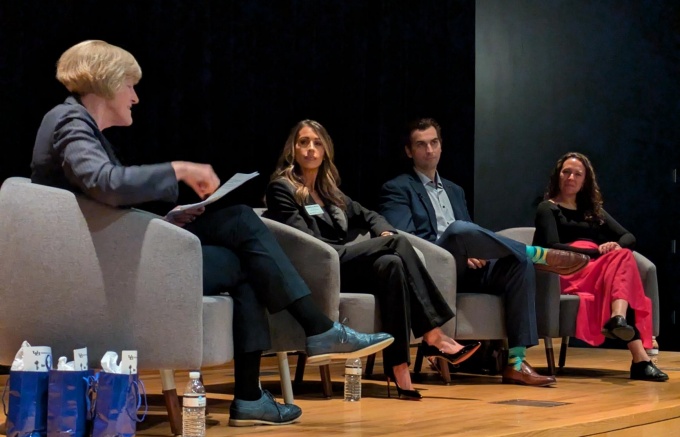ALUMNI NEWS
Career pathfinding offers insights on where a liberal arts degree can lead

By: Gina Cali-Misterkiewicz
Published Dec. 16, 2024
Finding your career path was the topic of an event hosted by the College of Arts and Sciences to help students learn more about career pathways. “Professional Pathfinding: Chart Your Own Career Map,” brought together students and alumni for a panel discussion that was mixed with real world experiences from three accomplished alumni who have each taken unique routes to their careers.
The panel, moderated by Robin Schulze, dean of the College of Arts and Sciences, featured Gabrielle Bailey, a communication graduate who now leads executive and shareholder engagement communications at Corning, Inc.; Tyler Bauer, a psychology graduate with a master’s in higher education administration who specializes in organizational change management at UB; and Katie Homer, a psychology and social work graduate who is the manager of philanthropy at the Buffalo AKG Art Museum.
Each speaker shared their personal journey from UB to their career and the ways their liberal arts education and the power skills they learned positioned them for success.
College of Arts and Sciences graduates bring the intellectual tools and the skills needed to succeed in any workplace or industry. The foundation of each speaker’s message included the key skills that are important to career pathfinding. These power skills include, building trust, critical thinking, strong communication skills, understanding diverse perspectives, working collaboratively and being able to adapt.
“If you were to tell me when I graduated that this would be my career, I would not have believed you,” said Bauer. “The skills that I developed during my time in the College helped prepare me for opportunities I did not know existed,” he continued.
It is the foundational skills that prepare graduates for the ever-evolving job market.
Bailey emphasized the role of curiosity, relationship building and using failure as fuel in shaping her professional approach. “Curiosity isn’t just asking questions, it’s about digging deeper, understanding what it is you’re really trying to do – the business challenge that you’re trying to solve and how you can work with others in your organization to make the greatest impact.”
Additionally, she shared a personal story about applying for an internship at Corning while in undergrad and getting turned down. She said, “that taught me to use failure as fuel. I never wanted to learn more about the company and its strategy and understand more deeply how I could uniquely add value to the organization than that experience did.” She credits those core skills developed at UB as core to her success.
As professionals reflecting on how their college degrees translated into the workplace, Homer shared, “studying psychology gave me the tools to understand human behavior—something that’s critical in philanthropy. It’s all about relationships and impact.”
What students are learning today are the power skills they will soon apply to the workplace. These are the differentiators that set College of Arts and Sciences graduates apart, and ahead in the workplace.
“The path may not be linear and that’s okay,” said Bauer. “You’re in the driver’s seat—own your journey.”
The event was co-sponsored by the College of Arts and Sciences, the UB Future Alumni Network and the Office of Alumni Engagement.